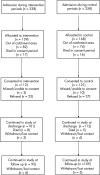Randomised trial of a parenting intervention during neonatal intensive care
- PMID: 17301114
- PMCID: PMC2675386
- DOI: 10.1136/adc.2006.103135
Randomised trial of a parenting intervention during neonatal intensive care
Abstract
Objective: To evaluate the influence of parenting intervention on maternal responsiveness and infant neurobehavioural development following a very premature birth.
Design: Cluster-randomised controlled trial, with a crossover design and three-month washout period.
Setting: Six neonatal intensive care units.
Patients: Infants born <32 weeks' gestation.
Intervention: The Parent Baby Interaction Programme (PBIP) is a supportive, educational intervention delivered by research nurses in the neonatal intensive care unit, with optional home follow-up for up to six weeks after discharge.
Main outcome measures: Parenting stress at 3 months adjusted age, as measured by the Parenting Stress Index (PSI). Other outcomes included the Neurobehavioural Assessment of the Preterm Infant (NAPI) and maternal interaction as assessed by the Nursing Child Assessment Teaching Scale (NCATS) and the responsivity subscale for Home Observation for Measurement of the Environment (HOME).
Results: 112 infants were recruited in the intervention phases and 121 in the control phases. Mean standardised NAPI scores at 35 weeks did not differ between the PBIP and control groups. Both groups had low but similar NCATS caregiver scores before discharge (36.6 in the PBIP group and 37.4 in control, adjusted mean difference -0.7, 95% CI -2.7 to 1.4). At three months, adjusted age mean PSI scores for the PBIP group were 71.9 compared with 67.1 for controls (adjusted mean difference 3.8, 95% CI -4.7 to 12.4). NCATS scores and HOME responsivity scores were similarly distributed between the groups.
Conclusion: This early, nurse-delivered, parent-focused interaction programme intervention had no measurable effects on short-term infant neurobehavioural function, mother-child interaction or parenting stresses.
Conflict of interest statement
Competing interests: None.
Comment in
-
A good idea that doesn't work: the Parent Baby Interaction Programme.Arch Dis Child Fetal Neonatal Ed. 2007 Nov;92(6):F427-8. doi: 10.1136/adc.2006.110957. Arch Dis Child Fetal Neonatal Ed. 2007. PMID: 17951548 Free PMC article.
References
-
- Greenberg M T, Crnic K A. Longitudinal predictors of developmental status and social‐interaction in premature and full‐term infants at age‐2. Child Dev 199859554–570. - PubMed
-
- Laucht M, Esser G, Schmidt M H. Vulnerability and resilience in the development of children at risk: the role of early mother–child interaction. Rev Psiquiatr Clin 20022920–27.
Publication types
MeSH terms
Grants and funding
LinkOut - more resources
Full Text Sources
Medical

